

The week in Brexit drama, explained. The Brexit debate set off another wild week in British politics that started with Parliament rebelling against Prime Minister Boris Johnson, continued with Johnson trying (and failing) to call new elections, and ended with Johnson declaring he’d “rather be dead in a ditch” than delay Brexit.

So, you know, just another week in UK politics these days. And that’s what all this drama has really been about: politics. This week’s hijinks had less to do with the actual substantive debate about Brexit and more to do with the political power games surrounding it. That’s because the UK is more or less in the same situation it has been in for the past year: The only Brexit deal on offer is the deeply unpopular one negotiated by former Prime Minister Theresa May. Parliament has repeatedly rejected it, along with all other Brexit options. That leaves exiting the EU without a plan on the October 31 deadline as the default option. Everyone, that is, except Boris Johnson.
What is the EU Single Market? What is the Transition Period? What is the Backstop? ON FEBRUARY 20th David Cameron, Britain's prime minister, set June 23rd as the date for a referendum on the country’s membership of the European Union. His announcement followed a protracted renegotiation of the current conditions of Britain’s membership at a summit in Brussels. The move immediately prompted government ministers to declare their backing for either the “remain” or “leave” campaigns. Mr Cameron strongly believes in the benefits of continued EU membership, but a handful of high-profile MPs, including justice secretary, Michael Gove, and London's mayor Boris Johnson, have pledged support for the “out” campaigners. In early 2015 the chances of ”Brexit”— Britain departing from the European Union—seemed remote. Today, largely because of Europe’s migration crisis and the interminable euro mess, the polls have narrowed.
Mr Cameron is himself partly responsible. Brexit timeline: The race to avert ‘no deal’ Parliament's options Hypothetically, if MPs vote to approve the withdrawal agreement with relatively little fuss, we should know with more certainty that 'no deal' has been avoided in January/early February - assuming of course that other EU member states ratify the deal as hoped.
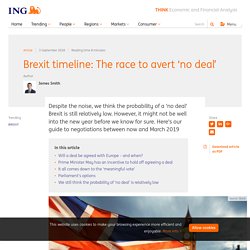
This would enable the transition period to commence as planned from late-March 2019. However, if MPs want further assurances about the future trading relationship - for example, Brexiteer MPs gather enough support to force the government to make firmer commitments about leaving the customs union and single market, then this may come as a blow to Theresa May, but it shouldn't be impossible to reconcile. Brexit: guide de rattrapage à deux mois de l’échéance. Le Brexit semble embourbé dans une crise permanente, monopolisant toute l’énergie du Royaume-Uni depuis le référendum de juin 2016.
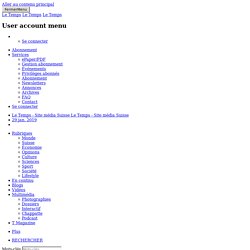
Ce mardi soir, les députés britanniques vont une nouvelle fois voter sur des amendements très importants pour la suite du processus. Pour essayer de s’y retrouver dans cet imbroglio, alors qu’il ne reste que deux mois avant l’entrée en vigueur théorique du Brexit, le 29 mars, voici un guide de rattrapage express. ■ Le parlement britannique débat, mais un accord sur le Brexit n’a-t-il pas été signé?
Si, l’Union européenne et le gouvernement britannique ont conclu un accord de retrait le 25 novembre. Mais celui-ci n'entrera en vigueur que s’il est ratifié. . ■ Pourquoi les députés sont-ils contre l’accord? ■ Qu’est-ce que le «backstop»? Il s’agit d’un «filet de sécurité», qui concerne la frontière entre l’Irlande du Nord et la République d’Irlande. . ■ Quel est le problème? ■ Mais pourquoi appelle-t-on ça le «backstop»?
At-a-glance: The UK's four Brexit options. Image copyright Getty Images With the UK on course to leave the European Union in March next year, the country faces four possible scenarios.
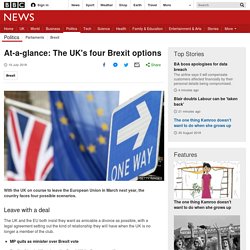
Leave with a deal The UK and the EU both insist they want as amicable a divorce as possible, with a legal agreement setting out the kind of relationship they will have when the UK is no longer a member of the club. Prime Minister Theresa May wants to keep close ties with the EU in certain areas, such as trade in agricultural products and allowing skilled migrants access to jobs in the UK. She says her plan will allow Britain to take back control of its laws, money and borders, just like people voted for in the 2016 EU referendum, while also allowing as "frictionless" trade as possible and avoiding a physical border for Northern Ireland. Brexit: All you need to know about the UK leaving the EU. Here is an easy-to-understand guide to Brexit - beginning with the basics, then a look at the negotiations, followed by a selection of answers to questions we've been sent.
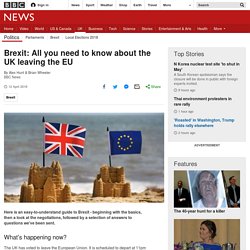
What's happening now? The UK has voted to leave the European Union. It is scheduled to depart at 11pm UK time on Friday 29 March, 2019. Brexit: Jargon-busting guide to the key terms. Confused by all the Brexit jargon in the news?
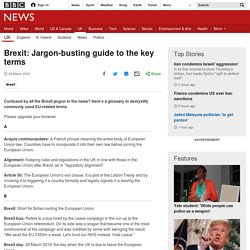
Here's a glossary to demystify commonly used EU-related terms. Please upgrade your browser Your guide to Brexit jargon Acquis communautaire: A French phrase meaning the entire body of European Union law. Countries have to incorporate it into their own law before joining the European Union.